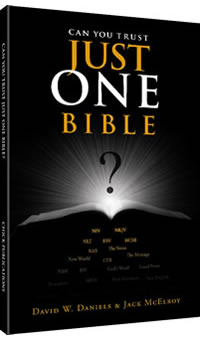The Geneva Bible: What's Wrong With It?
In early 21015, Jack McElroy and David W. Daniels got together to record an impromptu question and answer session about Bible versions. This is a transcript of a portion of that session.
Jack: What about the Geneva Bible? That was certainly a precursor, because there were a number of precursor English Bibles before the King James, starting with William Tyndale's 1525 edition New Testament, and from there, there was the Matthews Bible (1537), and Coverdale (1535), and the Great Bible (1539-41), and the Geneva (1560), and the Bishops' (1568). There was also another one, the Taverner's.
So there were a number of English Bibles. And now the questions has come up, "Well, what about all those previous English Bibles?" And especially, people are talking about the Geneva Bible. What does your research show you about the Geneva?
David: Well, the bottom line: I call it, "Close, but no banana." It's really close. It has a lot of really good points to it. It's based on pretty much the right text. But there are some compromises in it. And there are some changes in it. Sam Gipp has written something on that ("The 2006 Geneva Bible - The Trojan Horse") and put some things together.
I found some stuff as well with my 1599. You could look them up. But the bottom line is they weren't as literal, clear with the Hebrew and the Greek, so the meaning could stand up like the KJV. So you wouldn't even have to have to hold the Hebrew or the Greek. You have the King James Bible, now, here, and you can look through it and see the language right there, because it's the same meaning. God transferred it.
But sometimes they played little games. They weren't as clear. They weren't as defined in giving us exactly what God said and kind of paraphrased a little bit. And sometimes they added in some side doctrines that actually are not correct. The Geneva did it a few times. I don't want to get into all that right now.
Jack: I don't think that's necessary. But one of the arguments for the KJV, or one of the things they wanted to accomplish with the King James Bible, was that it wouldn't have any notes. It wasn't a study Bible, so to speak. You should study it, but it wasn't a study Bible.
David: Well, yeah, because all the notes that were in the Geneva, they really got into a lot of issues, kind of like getting Hal Lindsey's books on prophecy and somebody else's stuff on politics and kind of blending them all together, and putting them all in the side notes. It kind of detracts from the fact that you want what God said.
And so when the King James Bible was put together, the idea was that you read IT. And, of course, cross-references help us as we learn to read our Bible and as we learn what relates to what. It was just too many notes in the Geneva. And really, read them for yourself. Go download it. Check it out for yourself. You'll see why some of them are just downright silly. And some of them - I mean the world would have ended a long time before now if you believed their view of prophecy. (See the notes at the beginning of Revelation, etc.)
Jack: Interesting. That's good to know.
- See more articles on related topics:
- Bible Versions
- King James Bible
- Bible Translation
- History of Preservation
Products of interest:
-

Answers to Your Bible Version Questions
224 pages
David W. Daniels answers difficult questions about the KJV. Learn how to defend the KJV and why you can trust it. -

Can You Trust Just One Bible?
160 pages
Answers to the most common anti-KJV accusations. -

Understandable History of the Bible
557 pages
You'll learn the history of the Bible in this well-documented but easy-to-understand book. -

Did the Catholic Church Give Us the Bible?
208 pages
The Bible has two histories. One is of God preserving His words through His people. The other is of the devil using Roman Catholic "scholars" to pervert God’s words and give us corrupt modern Bibles.
